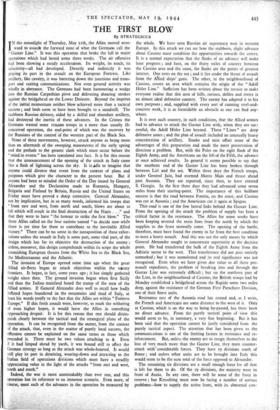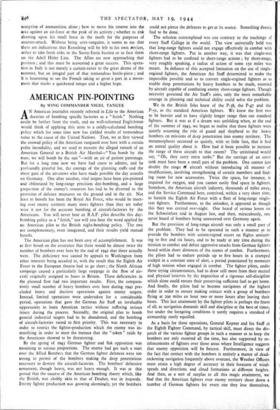THE FIRST BLOW
By STRATEGICUS
IN the moonlight of Thursday, May nth, the Allies moved west- ! ward to assault the forward zone of what the Germans call the "Gustav Line." It was this operation that broke the lull in major operations which had lasted some three weeks. The air offensive had been showing a steady acceleration. Its weight, its reach, its selectivity—all had developed. Directly and indirectly it was playing its part in the assault on the European Fortress. Like artillery, like cavalry, it was battering down the junctions and trans- port and cutting communications. Not even ground activity was wholly in abeyance. The Germans had been hammering a wedge into the Russian Carpathian pivot and delivering shearing strokes against the bridgehead on the Lower Dniester. Beyond the impetus of the initial momentum neither blow achieved more than a tactical success ; and both seem to have been brought to a standstill. The stubborn Russian defence, aided by a skilful and abundant artillery, had destroyed the inertia of these advances. In the Crimea the Germans wasted some 'mono troops in a more than usually ill- conceived operation, the end-point of which was the recovery by the Russians of the control of the western part of the Black Sea.
None of these movements, however, struck anyone as being more than an aftermath of the sweeping manoeuvres of the early spring and the prelude to the greater clash which must occur before the " mind in events" has been translated into fact. It is for this reason that the announcement of the opening of the attack in Italy came like a flash of lightning across the sky. It is idle to imagine that anyone could divorce that event from the context of plans and purposes which give the character to the present hour. But if anyone had been so minded the Order of the Day issued by General Alexander and the Declaration made to Rumania, Hungary, Bulgaria and Finland by Britain, Russia and the United States on Friday must have proved a sharp corrective. General Alexander, not by implication, but in so many words, informed his troops that " from east and west, from north and south, blows are about to fall which will result in the final destruction of the Nazis . . ." and that they were to have " the honour to strike the first blow." The three Allies called on the four nations named " to decide now while there is yet time for them to contribute to the inevitable Allied victory." There can be no sense in the juxtaposition of these exhor- tations unless the assault in Italy is some part, some vital part, of the design which has for its objective the destruction of the enemy ; unless, moreover, this design comprehends within its scope the whole astonishing European theatre from the White Sea to the Black Sea, the Mediterranean and the Atlantic.
The invasion of Europe opened some time ago when the great Allied air-fleets began to attack objectives within the enemy frontiers. It began, in fact, some years ago ; it has simply gathered weight since then. The ground invasion began when first Sicily and then the Italian mainland heard the tramp of the men of the Allied armies. If General Alexander does well to recall how badly inflated hopes foundered in the mountains and mud of Italy, at least his words testify to the fact that the Allies are within " Fortress Europe." If this fresh assault were, however, to mark the withering of even higher hopes, it would leave the Allies in something approaching despair. It is for this reason that one should distin- guish clearly between the tactical and the strategical plans of the operation. It can be recognised from the outset, from the context of the attack, that, even in the matter of purely local success, the offensive cannot be explained on the same terms as those which preceded it. There must be two values attaching to it. Even if it had limped ahead by yards, it was bound still to affect the German strategy so long as the attack was whole-hearted. It would still play its part in detaining, wearing-down and attracting to the Italian field of operations divisions which must have a steadily appreciating value in the light of the attacks "from east and west, north and south."
Indeed, the war is more unmistakably than ever one, and this operation has its reference to an immense scenario. Even more, of course, must each of the advances in the operation be measured by the whole. We have seen Russian air supremacy won in western Europe. In this attack we can see how the stubborn, slight advance about Cassino must condition the opportunities towards the centre. It is a normal expectation that the flanks of an advance will make least progress ; and here, on the thirty miles of country between the Cassino area and the coast, the flanks are the points of greatest interest. One rests on the sea ; and it lies under the threat of assault from the Allied ships' guns. The other, in the neighbourhood of Cassino, covers an area which contains the origin of the " Adolf Hitler Line." Sufficient has been written about the terrain to make everyone realise that this area of hills, ravines, defiles and rivers is an almost ideal defensive country. The enemy has adapted it to his own purposes ; and, supplied with every sort of cunning steel-and- concrete work, it is as formidable an obstacle as one can find any- where.
It is over such country, in such conditions, that the Allied armies had to advance to attack the Gustav Line with, when they are suc- cessful, the Adolf Hitler Line beyond. These " Lines" are deep defensive zones ; and the plan of assault included an unusually heavy concentration of artillery. Smoke and mist offset some of the advantages of this preparation and made the mere preservation of direction a problem. But, with the Poles on the right flank of the Eighth Army, and the Americans on the left of the Fifth, the advance at once achieved results. In general it seems possible to say that the southern end of the Gustav Line has been broken through between Liri and the sea. Within three days the French troops, under General Juin, had stormed Monte Majo and thrust ahead past Ausonia. They are reported, since then, to have entered S. Giorgio. In the first three days they had advanced some seven miles from their starting-point. The importance of this brilliant success is that the road between Formia, on the coast, and Cassino was cut at Ausonia ; and the Americans cut it again at Spigno.
This-road is one of the few lateral links behind the Gustav Line. From the opening of the attack the problem of supply has been a critical factor in the resistance. The Allies for some weeks have been keeping severed the main lines from the north by which the supplies to the front normally come. The opening of the battle, therefore, must have found the enemy in far from the best condition to meet a heavy assault. And this was not the only means by which General Alexander sought to concentrate superiority at the decisive point. He had transferred the bulk of the Eighth Army from the Adriatic sector to the west. This transference did not pass entirely unmarked ; but it was unmolested and its real significance was not recognised. Even when we have given due value to all these pre- assault expedients, the problem of breaking into and through the Gustav Line was extremely difficult ; but on the northern part of the Line, in the neighbourhood of Cassino, the British troops had by Monday established a bridgehead across the Rapido some two miles deep, against the resistance of the German First Parachute Division, one of their finest units.
Resistance east of the Ausonia road has ceased and, as I write, the French and Americans are some distance to the west of it. Only at Cassino, which is on the way to being by-passed, has there been no direct advance. From the purely tactical point of view this would seem to be, in summary, a very fine beginning. But it has been said that the operation cannot be justly considered from the purely tactical aspect. The attention that has been given to the communications is one of the limiting factors in resistance and re- inforcement. But, unless the enemy are to resign themselves to the loss of very much more than the Gustav Line, they must counter- attack with-considerable forces. They have 19 divisions south of Rome ; and unless other units are to be brought into Italy this would seem to be the sum total of the force opposed to Alexander.
The remaining six divisions are a small enough force for all that is left for them to do. Of the r9 divisions, the majority were in front of Anzio. In any case, there will be some of the force in reserve ; but Kesselring must now be facing a number of serious problems—how to supply the active front, with its abnormal con- gumption of ammunition alone ; how to move his reserve into the area against an air-force at the peak of its activity ; whether to risk drawing upon his small force in the north for the purposes of counter-attack. Without being over-sanguine, it seems to me that there are indications that Kesselring will be left to his own devices, either to take fresh risks in the Savoy-Istria bastion or to face them on the Adolf Hitler Line. The Allies are now approaching that position ; and this must be accounted a great success. This opera- tion in Italy is not merely a curtain-raiser to the great drama of the summer, but an integral part of that tremendous battle-piece ; and it is heartening to see the French taking so great a part in a move- ment that marks a quickened tempo and a higher hope.



























 Previous page
Previous page